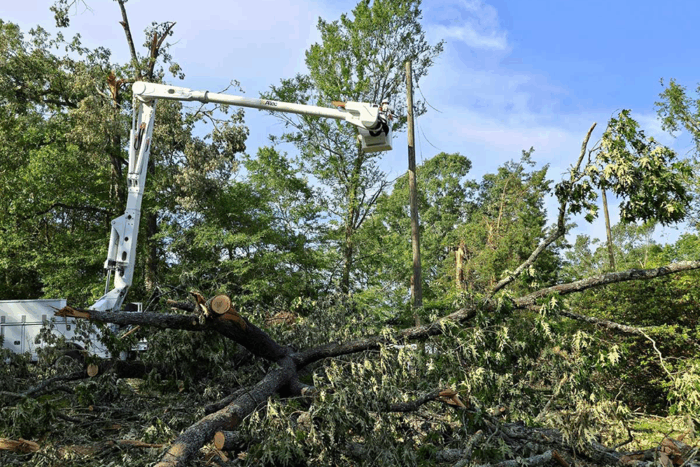
The Fixing Emergency Management for Americans (FEMA) Act of 2025 would keep in place FEMA’s essential Public Assistance program, which provides money to co-ops to restore power and rebuild their systems after natural disasters. Without those funds, NRECA says, rebuilding would take much longer and raise costs sharply for rural communities.
NRECA and its member co-ops have been strong advocates for improving FEMA while keeping the agency intact.
Why FEMA matters to electric cooperatives
The FEMA reform bill would greatly reduce the amount of time it takes for co-ops to receive reimbursements from the agency.
Specifically, it would direct the FEMA administrator to reimburse a co-op for emergency work no later than 120 days after it submits a request. The president would first need to determine that at least 90% of estimated costs are eligible for reimbursement, said Will Mitchell, a NRECA legislative affairs director who lobbies Congress on FEMA issues.
For longer-term projects to rebuild or replace infrastructure, the bill would require FEMA to review within 90 days a co-op’s cost estimate of the work that needs to be done, Mitchell said. After that, the agency would have 30 days to disburse the funds for the project.
“That would be a huge change in the timeline,” Mitchell said. “Right now, most co-ops are waiting years for reimbursement.”
Another big improvement, he said, is that co-ops would be allowed to build stronger, more resilient systems in the aftermath of disasters rather than being forced by the agency to build everything back exactly as it was before.
NRECA CEO Jim Matheson called FEMA “a crucial partner” in efforts to restore power after disaster strikes. The legislation would remove FEMA from the Department of Homeland Security and return it to its former status as an independent agency that reports directly to the president.
“Reforming FEMA into a stronger, more responsive agency will help strengthen rural resilience, protect taxpayer dollars and ensure essential services are restored as quickly as possible after a disaster,” Matheson said.
Sponsors from the Transportation and Infrastructure Committee introduced the legislation on July 23—the day the House adjourned for its summer recess. The committee is expected to have hearings on the bill after Congress returns to the nation’s capital in September. The panel will then vote on whether to send it to the full House for consideration.
If passed by the House, the legislation would still need to be approved by the Senate and signed into law by President Donald Trump.
As the FEMA reform bill continues through the process, NRECA will work to make it even better for co-ops, Mitchell said.
Specifically, he said, NRECA will lobby for a provision to make co-ops eligible to be reimbursed for the interest they must pay on loans to rebuild their systems while they wait to receive disaster funds from FEMA.
In most cases, not-for-profit co-ops have no choice but to pass those interest costs on to their consumer-members, many of whom live in rural communities with high poverty rates.
Transportation and Infrastructure Committee Chairman Sam Graves, R-Mo., one of the lead sponsors of the bill, said “the American people need an emergency management system that works quickly and effectively, not one that makes disaster recovery more difficult.”
“This bill does more than any recent reforms to cut through the bureaucracy, streamline programs, provide flexibility, and return FEMA to its core purpose of empowering the states to lead and coordinating the federal response when it’s needed,” Graves said.
Rep. Greg Stanton of Arizona, the senior Democrat on the panel’s Economic Development, Public Buildings and Emergency Management Subcommittee, said the bill would strengthen FEMA’s mission “to help Americans in their darkest hour.”
“The agency isn’t perfect, and its job is getting harder as disasters grow more frequent and more severe,” said Stanton, who is co-sponsoring the bill. “But the solution is not to tear FEMA down—it’s to work across the aisle to build FEMA up. This bipartisan bill takes commonsense steps to streamline the agency and make sure communities get disaster assistance quickly, efficiently and fairly.”


